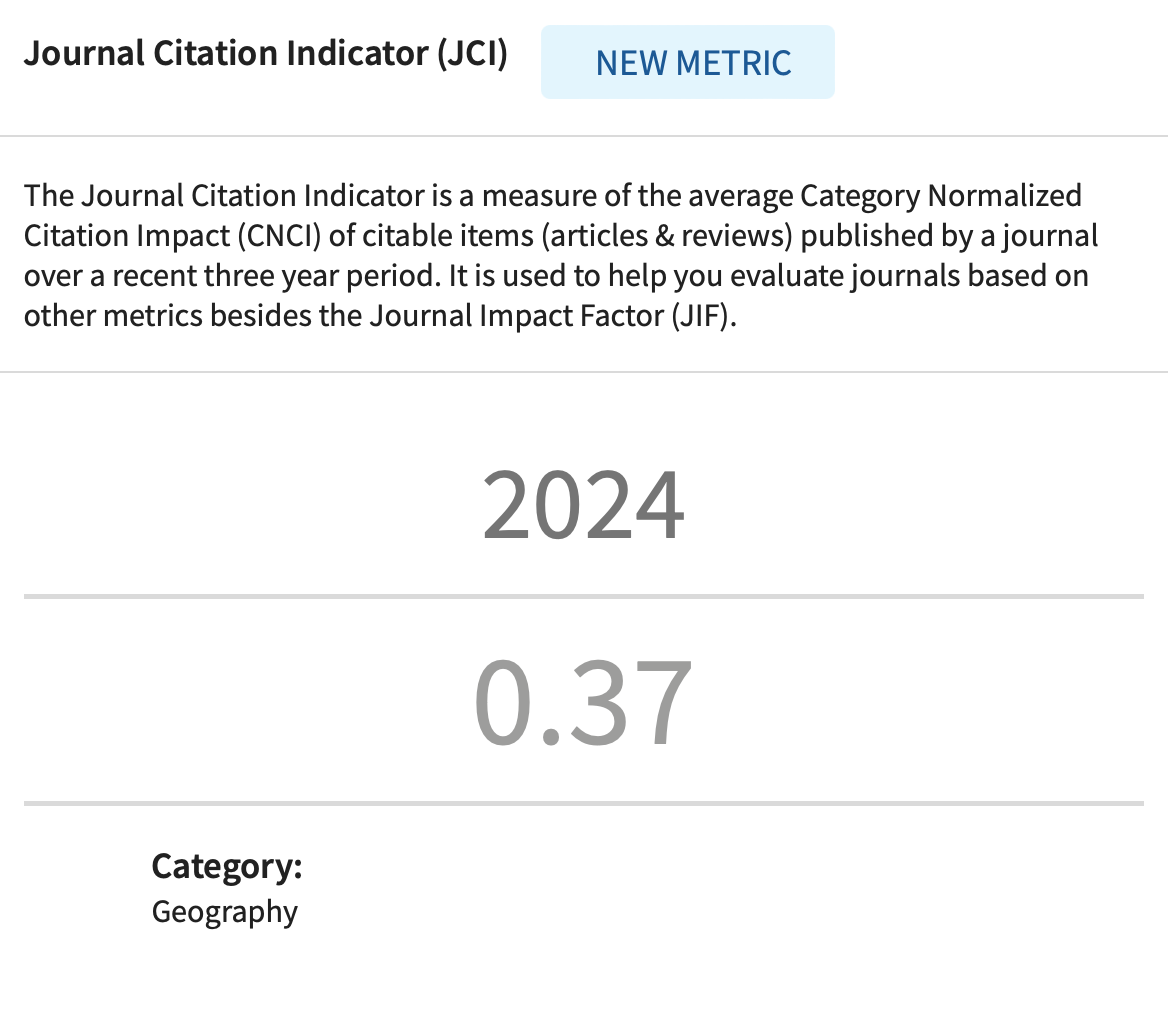ASSESSMENT OF BLACK ICE RISK LEVELS IN THE CITY CENTER OF ERZURUM (TURKEY) USING GEOSPATIAL DATA
DOI:
https://doi.org/10.2298/IJGI241028001GKeywords:
black ice, traffic accidents, Erzurum, TurkeyAbstract
Severe winter conditions, including extended snow cover and frequent frosty days, increase the risk of traffic accidents due to icing, leading to more accidents, even with injuries and fatalities. Erzurum (Eastern Anatolia Region, Turkey), with its harsh winters, stands out as a city requiring attention in this regard. The study focused on Erzurum city center, where the combination of winter weather conditions (October–April) and high traffic volume heightened the accident risk from icing in the period 2017–2022. Accident data from the General Directorate of Security of the Republic of Turkey and weather data from the General Directorate of Meteorology of the Republic of Turkey were analyzed, along with the area’s topographical characteristics (slope and aspect). The performed spatio-temporal analysis revealed that most accidents occurred in January (69 cases) and between 17:00 and 00:00 (136 cases). Accidents were linked to specific weather conditions: air temperatures between −11.7 and 0.6 °C, soil temperatures from −4.9 to −0.8 °C, wind intensity of 0 to 1.1 m/s, humidity levels between 81% and 100%, and cloudiness between 6 and 8.9. Hot Spot Analysis identified high-risk locations, including Saray Bosna Avenue, Atatürk Boulevard, and several major junctions. The study also suggested alternative systems to reduce accidents caused by icing on these routes.
Article metrics
References
Alaska Satellite Facility Data Search. (n.d.). ALOS PALSAR (Digital Elevation Data Resolution of 12.5 m). Retrieved January 5, 2021 from https://search.asf.alaska.edu/#/
Andrey, J., Mills, B., Leahy, M., & Suggett, J. (2003). Weather as a Chronic Hazard for Road Transport in Canadian Cities. Natural Hazards, 28, 319–343. https://link.springer.com/article/10.1023/A:1022934225431
Atalay, İ. (1992). Türkiye Coğrafyası [Geography of Turkey]. Ege University Publishing.
Bijleveld, F., & Churchill, T. (2009). The influence of weather conditions on road safety (Report No. R-2009-9). SWOV Institute for Road Safety Research. https://swov.nl/system/files/publication-downloads/r-2009-09.pdf
Black, A. W., & Mote, T. L. (2015). Effects of winter precipitation on automobile collisions, injuries, and fatalities in the United States. Journal of Transport Geography, 48, 165–175. https://doi.org/10.1016/j.jtrangeo.2015.09.007
Duran, F., & Teke, M. (2019). Akıllı Yol Durum Sensörü Tasarımı [Smart Road Condition sensor design]. International Journal of Engineering Research and Development, 11(1), 396–401. https://doi.org/10.29137/umagd.510777
Eisenberg, D. (2004). The mixed effects of precipitation on traffic crashes. Accident Analysis & Prevention, 36(4), 637–647. https://doi.org/10.1016/S0001-4575(03)00085-X
Environmental Systems Research Institute. (2016). ArcGIS Software / ArcMap (Version 10.5) [Computer programme]. ESRI. https://www.esri.com/en-us/home
Environmental Systems Research Institute. (n.d.). How Hot Spot Analysis (Getis-Ord Gi*) works. ArcGIS Pro [ESRI]. Retrieved May 25, 2024 from https://pro.arcgis.com/en/pro-app/latest/tool-reference/spatial-statistics/h-how-hot-spot-analysis-getis-ord-gi-spatial-stati.htm
Gailius, D., & Jačėnas, S. (2007). Ice detection on a road by analyzing tire to road friction ultrasonic noise. Ultragarsas/Ultrasound, 62(2), 17–20. https://www.ultragarsas.ktu.lt/index.php/USnd/article/view/17021/8355
General Directorate of Meteorology. (n.d.). Resmi İklim İstatistikleri [Official Climate Statistics]. Republic of Turkey, Ministry of Environment, Urbanization and Climate Change. General Directorate of Meteorology. Retrieved October 3, 2023 from https://www.mgm.gov.tr/veridegerlendirme/il-ve-ilceler-istatistik.aspx?k=A&m=ERZURUM
General Directorate of Meteorology of the Republic of Turkey. (2023). Meteorological Observation Data [Unpublished raw data]. General Directorate of Meteorology of the Republic of Turkey.
General Directorate of Security of the Republic of Turkey. (2023). Traffic Department, Traffic Accident Data [Unpublished raw data]. General Directorate of Security of the Republic of Turkey.
Getis, A., & Ord, J. K. (1992). The Analysis of Spatial Association by Use of Distance Statistics. Geographical Analysis, 24(3), 189–206. https://doi.org/10.1111/j.1538-4632.1992.tb00261.x
Gökdemir, T. (2013). Icing early warning system applications and case study of Istanbul [Master’s thesis, Bahçeşehir University / Institute of Science and Technology]. Council of Higher Education, National Thesis Centre. https://tez.yok.gov.tr/UlusalTezMerkezi/TezGoster?key=iTkOhwevEenJZ3onUvs52nl80hoHDeM2Esm3ThkLSoHv6ndrXlzKTHDEKQlXGaZG
Guha-Sapir, D., Vos, F., Below, R., & Ponserre, S. (2012). Annual Disaster Statistical Review 2011: The Numbers and Trends. http://www.cred.be/sites/default/files/ADSR_2011.pdf
Haque, F., Huq, A. S., Ishmam, Z. S., & Fuad, M. M. (2022, January 9–13). Visualizing the Hot Spots of Adverse Weather Induced Traffic Accidents in Bangladesh. Transportation Research Board 101st Annual Meeting. Washington DC, United States. https://annualmeeting.mytrb.org/OnlineProgram/Details/17496
Harirforoush, H., Bellalite, L., & Bénié, G. B. (2019). Spatial and Temporal Analysis of Seasonal Traffic Accidents. American Journal of Traffic and Transportation Engineering, 4(1), 7–16. https://www.sciencepublishinggroup.com/article/10.11648/j.ajtte.20190401.12
Joerger, M. D., & Martinez, F. C. (2006). Electric Heating of I-84 in Ladd Canyon, Oregon (Report No. FHWA-OR-RD-06-17). Oregon Department of Transportation. https://rosap.ntl.bts.gov/view/dot/21865/dot_21865_DS1.pdf
Kaya, G. (2022). Erzurum İlinin İklim Özellikleri [Climate features of Erzurum Province]. In S. Birinci, Ç. K. Kaymaz, & Y. Kızılkan (Eds.), Erzurum İlinde Coğrafya Araştırmaları (pp. 35–75). Kriter Publishing.
Khan, G., Qin, X., & Noyce, D. A. (2008). Spatial Analysis of Weather Crash Patterns. Journal of Transportation Engineering, 134(5), 191–202. https://doi.org/10.1061/(ASCE)0733-947X(2008)134:5(191)
Kuehnle, A., & Burghout, W. (1998). Winter Road Condition Recognition Using Video Image Classification. Transportation Research Record, 1627(1), 29–33. https://doi.org/10.3141/1627-05
Lee, J.-K., Huh, Y., & Park, J. (2022). Geospatial Simulation System of Mountain Area Black Ice Accidents. Applied Sciences, 12(11), Article 5709. https://doi.org/10.3390/app12115709
Li, C., Ge, H., Sun, D., & Zhou, X. (2021). Novel conductive wearing course using a graphite, carbon fiber, and epoxy resin mixture for active de-icing of asphalt concrete pavement. Materials and Structures, 54, Article 48. https://link.springer.com/article/10.1617/s11527-021-01628-7
Liu, T., Pan, Q., Sanchez, J., Sun, S., Wang, N., & Yu, H. (2017). Prototype Decision Support System for Black Ice Detection and Road Closure Control. IEEE Intelligent Transportation Systems Magazine, 9(2), 91–102. https://doi.org/10.1109/MITS.2017.2666587
Mitas, A., Bernaś, M., Bugdol, M., & Ryguła, A. (2011). The concept of neural network applications to the analysis of weather parameters for risk prediction. Zeszyty Naukowe Politechniki Białostockiej. Informatyka, 8, 45–59. https://bibliotekanauki.pl/articles/341185.pdf
Mohammed, A. A., Ambak, K., Mosa, A. M., & Syamsunur, D. (2019). A Review of Traffic Accidents and Related Practices Worldwide. The Open Transportation Journal, 13, 65–83. http://dx.doi.org/10.2174/1874447801913010065
Monsere, C. M., Bertini, R. L., Bosa, P. G., Chi, D., Nolan, C., & El-Seoud, T. A. (2006). Comparison of Identification and Ranking Methodologies for Speed-Related Crash Locations (Report No. FHWA-OR-RD-06-14). Oregon Department of Transportation. https://rosap.ntl.bts.gov/view/dot/21868/dot_21868_DS1.pdf
Nokhandan, M. H. (2006, March 25–27). Statistical analysis of weather related Road Accidents in Iran. The 13th SIRWEC Conference. Torino, Italy. https://sirwec.org/torino-italy-2006/
Onur, A. (1961). Erzurum ve Çevresinde Kar Yağışlı ve Karla Örtülü Günler [Snowy and snow-covered days in Erzurum and its surroundings]. Turkish Geographical Review, 21, 97–111. https://dergipark.org.tr/tr/pub/tcd/issue/21264/228284
Orhan, F., & Güney, E. (2023). Erzurum’un Metropol İlçelerindeki Yerleşmelerin Alansal Gelişim Süreci ile Jeomorfolojik Birimler Arasındaki İlişkinin Cbs ve Ua Yöntemleriyle Analizi [Analysis of the relationship between the spatial development process of settlements in metropolitan districts of Erzurum and geomorphological units by GIS and RS methods]. Erzincan University Journal of Graduate School of Social Sciences, 16(2), 156–180. https://doi.org/10.46790/erzisosbil.1326303
Özlü, T., Haybat, H., & Zerenoğlu, H. (2021). Trafik Kazalarının Zamansal ve Mekânsal İncelenmesi: Eskişehir Şehir Örneği [Temporal and spatial investigation of traffic accidents: the case of Eskişehir City]. International Journal of Geography and Geography Education, 43, 136–158. https://doi.org/10.32003/igge.746447
Rodman, K., & Williams, A. (n.d.). Black ice: How to spot this winter driving danger. AccuWeather. Retrieved February 20, 2025 from https://www.accuweather.com/en/weather-news/black-ice-how-to-spot-this-winter-driving-danger-2/434138
Şahin, C. (2006). Türkiye Fiziki Coğrafyası [Physical geography of Turkey]. Gündüz Education and Publishing.
Sheather, S. J. (2004). Density Estimation. Statistical Science, 19(4), 588–597. http://dx.doi.org/10.1214/088342304000000297
Shi, X., & Fu, L. (Eds.). (2018). Sustainable Winter Road Operations. John Wiley & Sons Ltd. https://onlinelibrary.wiley.com/doi/book/10.1002/9781119185161
Silverman, B. W. (1998). Density Estimation for Statistics and Data Analysis. Chapman & Hall/CRC. https://doi.org/10.1201/9781315140919
Tharmakularajah, L., Döring, J., & Krieger, K.-L. (2020). Infrared-based sensor system for contactless monitoring of wetness and ice. Journal of Sensors and Sensor Systems, 9(1), 133–141. https://doi.org/10.5194/jsss-9-133-2020
Turkish Statistical Institute. (n.d.). Traffic Accident Statistics. Turkish Statistical Institute [TURKSTAT]. Central Dissemination System. Retrieved December 15, 2023 from https://biruni.tuik.gov.tr/medas/?locale=en
Yang, Z., Yang, T., Song, G., & Singla, M. (2012). Experimental Study on an Electrical Deicing Technology Utilizing Carbon Fiber Tape (Report No. INE/AUTC 12.26). Alaska University Transportation Center. https://rosap.ntl.bts.gov/view/dot/25408/dot_25408_DS1.pdf
Downloads
Published
How to Cite
Issue
Section
License
Copyright (c) 2025 Journal of the Geographical Institute “Jovan Cvijić” SASA

This work is licensed under a Creative Commons Attribution 4.0 International License.











